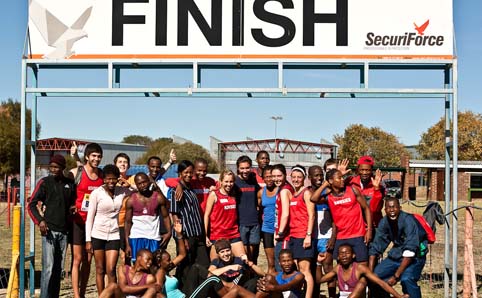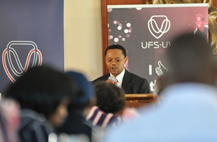Latest News Archive
Please select Category, Year, and then Month to display items
20 August 2025
|
Story Dr Annelize Oosthuizen
|
Photo Supplied
 Dr Annelize Oosthuizen, Subject Head of Taxation in the School of Accountancy, University of the Free State.
Dr Annelize Oosthuizen, Subject Head of Taxation in the School of Accountancy, University of the Free State.
With the two-pot retirement system having been effective from 1 September 2024, it is important to demystify certain aspects to prevent an unpleasant surprise when you retire. Although there are other complex rules, this article was simplified and does not deal with exceptions. It also does not deal with members of a provident fund who were 55 years of age or older on 1 March 2021. Furthermore, reference to retirement funds is to a pension fund, provident fund or a retirement annuity fund (a discussion on preservation funds is therefore excluded).
Three, not two pots
Firstly, there are effectively three pots and not two.
- The first pot is referred to as the vested component. You will only have this component if you were a member of a retirement fund prior to 1 September 2024. This component consists of the member’s interest (balance) in the retirement fund on 31 August 2024 (the day before the implementation of the two-pot system) after being reduced with the amount of the seed capital that was transferred to the savings pot (see below). This seed capital amount was calculated as the lesser of 10% of the value of the member’s interest in the fund on 31 August 2024 or R30 000. No further contributions will be allocated to this component from 1 September 2024. Upon retirement, one-third of the funds in this component can be taken in the form of a lump sum. The balance will be transferred to the retirement component below and will be paid out in the form of monthly annuities.
- The second pot is the savings component. The opening balance of the savings component is the seed capital that was transferred from the vested component above. Thereafter, from 1 September 2024, one third of your monthly contributions to the retirement fund are allocated to this component.
- The third pot is the retirement component. From 1 September 2024, two-thirds of your monthly contributions to the retirement fund are allocated to this component. The funds in this component can only be accessed upon retirement (i.e. after reaching your retirement age, which is stipulated in the fund rules). Furthermore, upon retirement, the money in this pot is only paid out in the form of monthly annuities (i.e. monthly pensions) and no lump sum can be taken from this pot unless its total value is R165 000 or less.
Withdrawals are taxed unfavourably
Secondly, withdrawing from the savings component before retirement has adverse tax implications.
- From 1 September 2024 onwards, one is allowed to make an annual withdrawal (minimum of R2 000) from the savings component even if you have not yet reached your retirement age and although you are still employed. It is, however, important to remember that such withdrawals are taxed very unfavourably since they are taxed by using the normal progressive tax tables that apply to your other income such as salary. If you wait for your retirement and only withdraw from this savings component upon retirement, the first R550 000 will be tax-free and withdrawals above R550 000 will be taxed at rates much lower than the current progressive tax rates applicable to other income.
- Upon retirement, only the money in the savings component is allowed to be taken as a lump sum. If you therefore withdraw all the money from this pot annually prior to retirement, you will not have any funds available to access as a lump sum on retirement and will only have access to the monthly annuities payable from your retirement component.
Less funds available
Lastly, for those members who have a vested component (i.e. who became members of the retirement fund before 1 September 2024), the old rules still apply to the funds in that component. Therefore, upon retirement, you will still be able to take one third of the value of your vested component as a lump sum. The balance will be transferred to the retirement pot and will be paid out in the form of monthly annuities.
To summarise, even though it might appear lucrative to withdraw from your savings component annually, it is advised that you refrain from doing it unless you really need the funds to fulfill basic needs. Withdrawing prior to retirement has the following adverse consequences:
- Money withdrawn from the savings component is taxed at higher rates than what would have applied had you reached your retirement age and retired. You will therefore not make use of the R550 000 tax-free option.
- You will have less funds available to pay out as a lump sum on retirement. As a simple calculation, had you not withdrawn R30 000 in a single year, conservatively calculated at a rate of 5%, this R30 000 would have grown to R79 599 (R139 829 if a rate of 8% is used) calculated over 20 years that can be withdrawn tax-free when utilising the R550 000 tax-free portion on retirement.
Intravarsity brings Kovsie Campuses together
2012-05-09
 |
|
Bloemfontein and Qwaqwa Campuses find each other in sport, arts and culture.
|
|
Intravarsity Photo Gallery
|
|
Intravarsity
Two campuses, one university, students coming together for a weekend filled with sport, arts and culture. That was the backdrop to Intravarsity 2012, which was held at the University of the Free State (UFS) on 4 and 5 May 2012.
Students from the Bloemfontein and Qwaqwa Campuses came together on the Main Campus to compete in soccer, netball, cross-country, basketball, debating and chess.
The Qwaqwa Campus raked up victories in soccer with their men’s and women’s teams beating their Bloemfontein counterparts. The women’s team won 3-2, while the men triumphed with 1-0.
Bloemfontein Campus beat Qwaqwa Campus 34-12 in netball, 2-0 in chess and 36-34 in basketball.
However, Intravarsity is not just about sport. Students from the two campuses also engaged in art, cultural and leadership events. These events included a musical festival with top local DJs and a leadership breakfast attended by the student leadership from both campuses.
Talking at the leadership breakfast, Prof. Kwandiwe Kondlo, Head of the Centre for Africa Studies, urged student leaders to strive for selfless leadership. “We want our student leaders to be better leaders than we are. Perhaps at one moment some of you may end up leading this country. I hope when your time comes you will save South Africa from the democratisation of shamelessness and corruption, which has gained the upper hand.”
Mr Rudi Buys, Dean of Student Affairs, told the student leaders that the institution was in crisis five years ago. “Today our campuses are together. I hope the significance of the weekend is not lost.”
Intravarsity 2012 replaced this year’s Intervarsity. The annual Intervarsity between the UFS and North-West University (NWU) has been postponed to 2013.
|
Kovsie student leaders discuss leadership at Intravarsity
 Student leaders from the Bloemfontein and Qwaqwa Campuses attended a leadership breakfast during the Intravarsity weekend of 4 and 5 May 2012. The breakfast, held on the Main Campus, was hosted by the Division: Student Affairs. Student leaders from the Bloemfontein and Qwaqwa Campuses attended a leadership breakfast during the Intravarsity weekend of 4 and 5 May 2012. The breakfast, held on the Main Campus, was hosted by the Division: Student Affairs.
Taking lessons in leadership from Prof. Kwandiwe Kondlo, Head of the Centre for Africa Studies, the Kovsie student leaders discussed the duties and responsibilities of leadership, not only on our campuses but also throughout the country.
Highlighting the role of student leadership Prof. Kondlo told students they needed to be active partners in building a cohesive and united university.
“Student leadership is important in the life of any university; it creates conditions the university requires for the construction and production of knowledge. This is very important; hence cooperation between student leadership and management is so vital.”
Prof. Kwandiwe Kondlo’s speech that he delivered at the leadership breakfast. (pdf format)
|